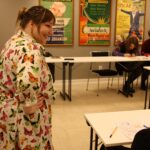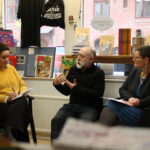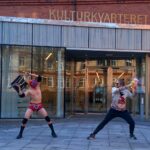[10–11 nov] Papperslösa på papper och i verklighetens Europa: Paula Bulling, Kalle Hakkola
Paula Bulling talar om sin bok Im Land der Frühaufsteher om livet som asylsökande i Tyskland med Kalle Hakkola som presenterar Ville Tietäväinens bok Näkymättömät kädet (Invisible Hands) om en papperslös marockan i Europa. Det blir ett jämförande samtal om arbetet med de två serieböckerna, situationen för dem de handlar om i de olika länderna och även hur det ser ut här hemma.
Deltagare
Paula Bulling [Tyskland]
Född 1986 i Berlin. Paula är serietecknare och översättare. Hon har studerat grafisk design och keramik på Burg Giebichenstein i Halle (Saale) och har nyligan fått sin första graphic novel publicerad: Im Land der Frühaufsteher. Är för närvarande involverad i flera olika samarbetsprojekt i serieform, bland annat med filmmakaren Maman Salissou Oumarou. Hon bor och arbetar i Berlin där hon också en en del av kollektivet Interflugs.
Valda titlar:
- Im Land der Frühaufsteher (Avant verlag)
- www.paulabulling.net
Om Im Land der Frühaufsteher
My first comic book, 128 pages, has been published by Avant Verlag. The book is based on experiences I made when researching the situation of asylum seekers in the east of Germany. In 7 loosely connected chapters, it talks about life in refugee camps, encounters with everyday racism and violence. It also raises the question of how to tell such a story as a white artist.
/Paula Bulling
Om Näkymättömät Kädet
This 216-page comic book tells the story of an undocumented Moroccan migrant in Europe. It is the story of a person who ventures into the world to build his own identity, but loses himself in the process. The book’s central theme is the universal right to the pursuit of happiness, independent of one’s starting position. It raises questions about the physical and ideational borders of Europe, symbol of prosperity. Although it is largely based on actual events, Invisible Hands is neither a sociological study nor a political manifesto. The times, places, human fates and objective truths and subjective experiences contained in the story have been altered to protect the identities of real-life characters and for dramatic purposes. Western media invariably discuss “illegal” immigration in a distanced and distorted way. Immigrants are portrayed as a homogenous mass, not as real people. The main aim of the story is to present a different picture, by focusing on the motives and experiences of individuals.
/Ville Tietäväinen










